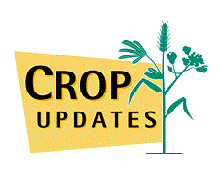Document Type
Conference Proceeding
Publisher
Department of Agriculture
City
Perth
Publication Date
19-2-2003
Keywords
Canola varieties, large scale plots, triazine, imidazolinone, Clearfield, yield, gross margin, ovules, seed, oil, embryos, cotyledons, temperature, water supply, model, Brassica napus, B. juncea, interspecific crosses, oil quality, fertiliser N timing, growth stages, oil concentration, moisture stress, potash, duplex soil, Surpass 501, establishment, seeding, depth, press wheels, chain, stubble, harvest, knife, front, fingers, air reel, lupins, ryegrass, seed rate, competition, aphids, feeding damage, pests, green peach aphid, resistance management, dimethoate, esterase, seed dressing, virus, disease, pest control, yield increase, blackleg, spore showers, monitoring, management, DBM, insecticide control, insecticide application, population dynamics
Disciplines
Agribusiness | Agronomy and Crop Sciences | Entomology | Plant Biology | Plant Breeding and Genetics | Plant Pathology
Abstract
This session covers fifteen papers from different authors
ACKNOWLEDGMENTS
VARIETIES
-
Large scale canola varietal evaluation in WA, Peter Nelson, Oilseeds WA
-
Performance of IT and TT canola varieties in the medium and high rainfall agzones of WA 2001-02, Graham Walton, Hasan Zaheer and Paul Carmody, Department of Agriculture
QUALITY
-
Reproductive biology, cotyledon development and oil accumulation in canola, J.A. Fortescue and D.W. Turner, School of Plant Biology, Faculty of Natural and Agricultural Sciences, The University of Western Australia
-
Plant and environmental factors affecting oil concentration in canola – a mini-review, D.W. Turner, School of Plant Biology, Faculty of Natural and Agricultural Sciences, The University of Western Australia
-
Potential benefits from interspecific crosses between canola and ‘near canola’ quality Indian mustard, Janet Wroth, School of Plant Biology, The University of Western Australia (UWA), Wallace Cowling, School of Plant Biology, UWA and CBWA Pty Ltd, Anh-Van Pham, School of Mathematics and Statistics, UWA
-
NUTRITION, AGRONOMY AND MACHINERY
-
Timing of nitrogen application for producing canola grain and oil, R. F. Brennan, Department of Agriculture
-
Managing canola for soil type and moisture stress, Paul Carmody and Hasan Zaheer Department of Agriculture
-
Machinery lessons from 2002 – canola establishment, Glen Riethmuller, Greg Hamilton and Jo Hawksley, Department of Agriculture
-
Machinery lessons from 2002 – harvesting short crops, Glen Riethmuller, Department of Agriculture
-
Does increasing canola seeding rate reduce the competitiveness of grass weeds? Zaicou-Kunesch, C.M., Zaheer, S.H. and Eksteen, D, Department of Agriculture
PESTS AND DISEASES
-
Aphid damage to canola – not all cultivars are equal, Françoise A. Berlandier and Christiaan Valentine, Department of Agriculture
-
Should we be worried about developing insecticide resistance in aphids? Owain Edwards, CSIRO Entomology
-
Benefits provided by treating canola seed with imidacloprid seed dressing, Roger Jones, Brenda Coutts, Lisa Smith and Jenny Hawkes, Department of Agriculture, and Centre for Legumes in Mediterranean Agriculture
-
Blackleg levels in canola in 2002, Ravjit Khangura1, Moin Salam1, Art J Diggle1 and Martin J Barbetti1,2 1Department of Agriculture, 2University of Western Australia
-
DBM in canola, Kevin Walden, Department of Agriculture
Recommended Citation
Nelson, P,
Walton, G,
Zaheer, H,
Carmody, P,
Fortescue, J A,
Turner, D W,
Wroth, J,
Cowling, W,
Pham, A,
Brennan, R F,
Riethmuller, G,
Hamilton, G,
Hawksley, J,
Zaicou-Kunesch, C M,
Eksteen, D,
Berlandier, F A,
Valentine, C,
Edwards, O,
Jones, R,
Coutts, B,
Smith, L,
Hawkes, J,
Khangura, R,
Salam, M,
Diggle, A J,
Barbetti, M J,
and
Walden, K.
(2003), Crop Updates - 2003 Oilseeds. Department of Agriculture, Perth. Conference Proceeding.
https://library.dpird.wa.gov.au/crop_up/69
Included in
Agribusiness Commons, Agronomy and Crop Sciences Commons, Entomology Commons, Plant Biology Commons, Plant Breeding and Genetics Commons, Plant Pathology Commons




Comments
Please cite papers individually